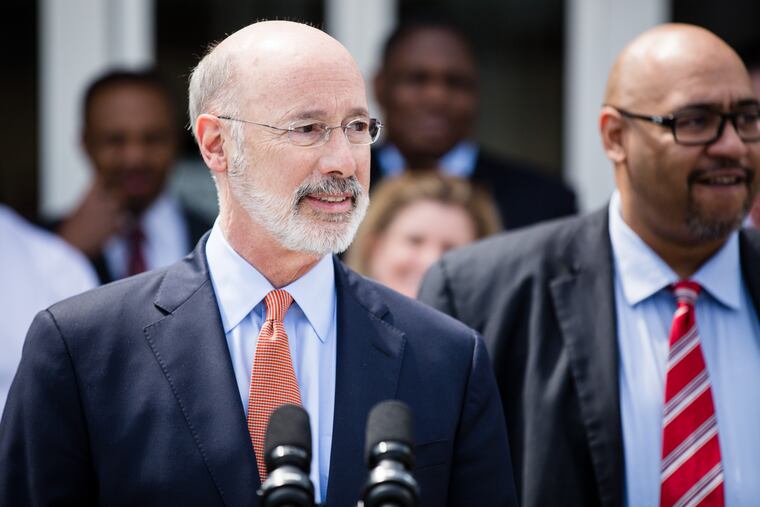Coronavirus death counts exceed one per day in Pa. prisons. Gov. Wolf needs to use all the tools he has. | Editorial
Reprieve is an imperfect tool to respond to coronavirus in prisons, but it’s all Pennsylvania has right now.

Coronavirus is raging in Pennsylvania’s state prisons. In the first 20 days of 2020, at least 27 people incarcerated in Pennsylvania’s state prisons and two staffers died of coronavirus — more than all of the fatalities between March and November. Overall, 91 incarcerated individuals and four staffers have died during the pandemic. That’s tragic, especially since some of those deaths might have been avoided by reducing the prison population.
Both Gov. Tom Wolf and Corrections Secretary John Wetzel have argued that reducing the size of the prison population — currently 38,300 — is one of the elements of the Department of Corrections’ response to the virus. However, the governor has backed away from using the only tool in his disposal to create more space for social distancing inside of prisons: reprieve.
The Pennsylvania Constitution grants the governor the power of pardon, commutation, and reprieve. The only one of the three that the governor can use unilaterally is reprieve; commutations and pardons require the recommendation of the Board of Pardons. Reprieve is a pause in a prison sentence after which the individual returns to prison. The time that they were out does not count toward the sentence. In the past, Wolf used reprieve to impose the moratorium on execution.
In April, Wolf announced a reprieve program — targeted at elderly and infirm offenders whose crime does not include a victim — that was originally intended to release as many as 1,200. The executive action was intended to be more ambitious than a Republican reprieve plan that included a cap of 450 reprieves.
» READ MORE: Latest outbreak in a Pennsylvania prison infected more than a thousand, killing 9
But Wolf signed only 159 reprieves back in the spring. He has not signed any more since, even as the death toll skyrocketed.
In a January hearing hosted by the Pennsylvania Senate Democrats’ Policy Committee on coronavirus in prisons, State Sen. Nikil Saval of Philadelphia pressed Secretary Wetzel on reprieves. Wetzel told Saval that “the governor is not interested in reprieving more people given the current construct.” When further pressed by Saval, Wetzel said he does not think reprieve is a “good tool” because it is “unfair” that the time doesn’t count against the original sentence.
Wetzel has a point. Reprieve is far from a perfect tool. But weighing the risk of being exposed to a fatal virus vs. the counting of time served should be weighed by the people who are taking the risk, not solely the governor. The governor’s office told this board that because the time doesn’t count, some incarcerated individuals “chose not to participate” in the reprieve program. But in June, SpotlightPA reached out to two dozen incarcerated individuals who were identified as eligible for reprieve. Some didn’t even know they had been identified.
The governor, and every one of his departments, has been pulled in many directions over the last few months — an unprecedented assault on Pennsylvanians’ right to vote didn’t help. But now his attention must focus on the crisis in Pennsylvania’s state prisons.
Wetzel maintains that instead of reprieve, Pennsylvania needs medical parole legislation. The two aren’t mutually exclusive. Philadelphia State Sen. Sharif Street is planning to introduce a medical parole bill. A similar bill didn’t get a committee vote last session. When the death count exceeds one per day, waiting for a bill to go through the Republican legislature — the same one that just challenged the election and minimized the pandemic response — is not an option.
The reduction in prison population in 2020 — by nearly 6,500 individuals — is also not an excuse for inaction. While there has been a 44% reduction in admissions compared with 2019, that can change quickly when courts go back to full capacity.
» READ MORE: Pennsylvania prisons’ unreliable COVID data hides the true extent of the crisis | Editorial
Meanwhile, DOC continues to refuse to require staff to undergo coronavirus testing and faces scrutiny over claims that family members and incarcerated individuals were not notified when their loved ones were sick or even died. The DOC’s coronavirus dashboard, a data portal that is a rare view behind prison walls, continues to be littered with inconsistencies and masks the full extend of the crisis.
Reprieve is an imperfect tool and a legislative solution would be better. The governor made difficult decisions to respond quickly and firmly to the pandemic crisis. He should be as steadfast in his approach to relieving the serious and deadly crisis in our prisons.